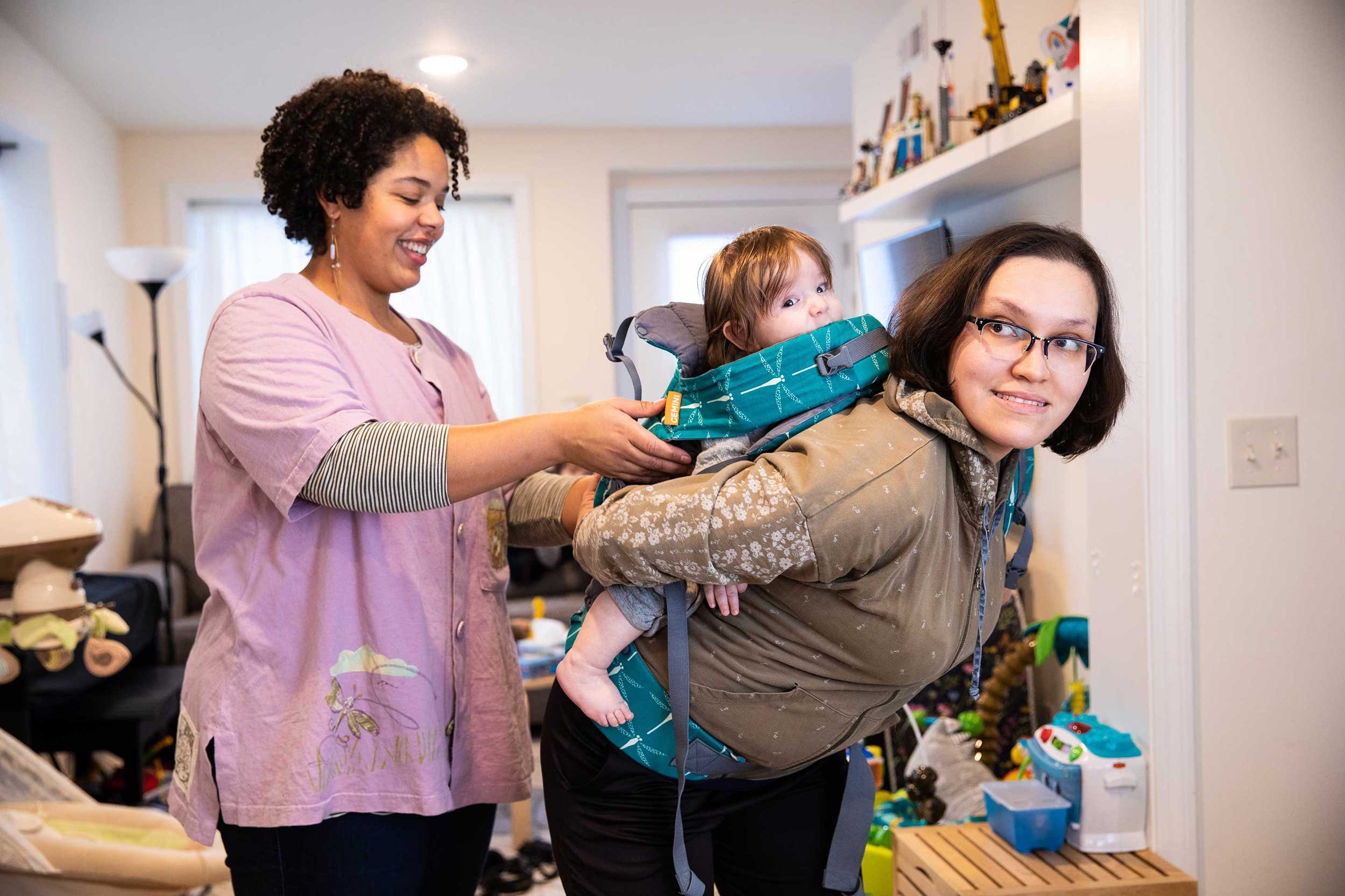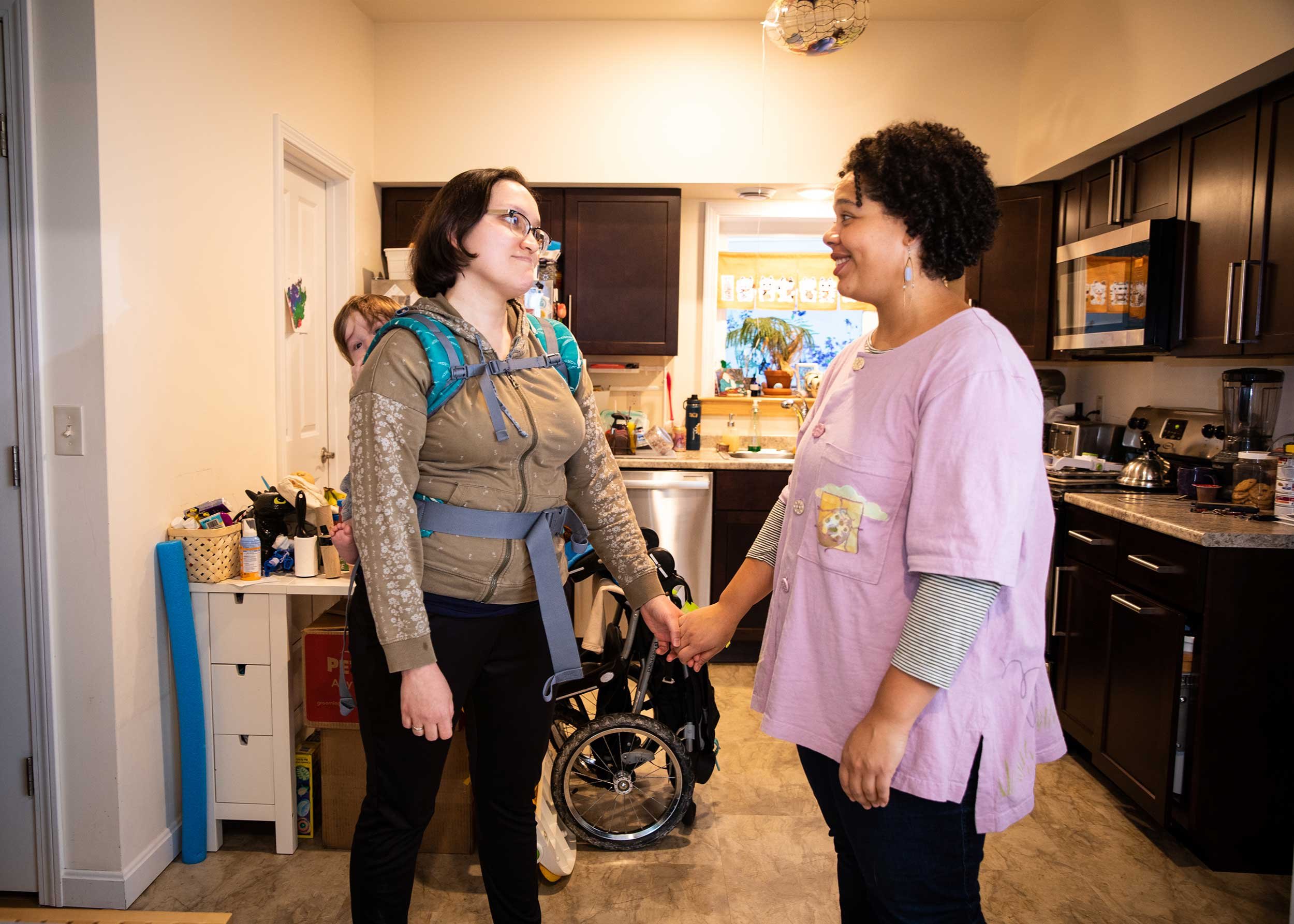“It's definitely not a nine-to-five life. 'Business-hours doula' is not really a thing. But that's totally OK with me. I love the unpredictability of my life.” –Greer Sargeant

Vermont Visionaries: Greer Sargeant, Postmodern Doula
Story, photos and video by Cat Cutillo
A few days after Aisha Mueller gave birth to her second child, a familiar feeling of anxiety crept up on her. She recognized the unwelcome emotions she had experienced during her first pregnancy and in the months after the child's birth. She said she felt like she was drowning.
"With my first, my mental health was really stretched, to put it lightly," she said. "I had severe anxiety and OCD, which started when I was pregnant with [my eldest son], about halfway through the pregnancy. Even after he was born, it persisted. It kind of closed my world."
Wanting to get ahead of the problem this time, she asked her husband, Matt Winter, to find a postpartum doula — a trained professional to support her before, during and after the birth. The very next day, Greer Sargeant, who owns Postmodern Doula, was sitting in Mueller's bedroom in Shelburne, a place Mueller fondly described as her "nest" in those early newborn days.
"Seeing her come in was instant relief," Mueller said. "I'm someone who finds it hard to ask for help, partly because I'm an introvert and partly because sometimes we feel we need to push through."
For the next two months, Sargeant helped with dishes; laundry; feeding the family cats; playing with the baby's big brother, Aidan; and holding newborn Idris so Mueller could shower or nap. Sargeant fit Mueller with a baby carrier that wouldn't exacerbate her back problems and helped to institute a nap routine for Idris.
Five months after Idris' birth, Sargeant sat in Mueller's living room and told her that the best part of being her doula was helping to affirm all the things that Mueller was doing right by saying such supportive words as, "You're so sweet to your baby, and you talk so kind to him. Even just the way you would change him — you would chat with him and look into his eyes. There's a reason he's such a happy baby."
Becoming a doula was Sargeant's teenage dream. She pinpointed the career for herself at 16 after watching a documentary that showed raw footage of birth, with women "standing in their own power" instead of the usual "medicalized, emergency baby stories on TLC."
Sargeant, now 27, launched her business, Postmodern Doula, in 2019. She was a recent graduate of the University of Vermont, where she had taken classes about disparities in medical care and the impact of bias and racism on the health outcomes of people of color and queer families.
Black women are three times more likely to die from a pregnancy-related cause than white women, according to the Centers for Disease Control and Prevention. Multiple factors contribute to that disparity, including "variation in quality healthcare, underlying chronic conditions, structural racism, and implicit bias." The CDC also reported that mental health is the leading underlying cause of all pregnancy-related deaths.
Sargeant, who's Black, learned that when doulas were a part of births for these folks, the patients had better outcomes.
"And I was like, that's where I'm meant to be. That is exactly it," she recalled.
There aren't any statistics tracking how many doulas are working in Vermont, but Sargeant said she's one of just a few Black doulas in the entire state.
"I definitely work with a lot of queer families, a lot of families of color, single parents by choice, families that have different histories, whether that be mood disorders or maybe they have a disability. Folks that historically feel underrepresented or less seen, I tend to find a compatibility with being their doula," Sargeant said. She also frequently works with people who want to have a vaginal delivery after having had a child delivered by cesarean.
Her services are customized to each family and can include birth doula support, daytime postpartum care and childbirth education. She offers low-cost childbirth education for Black families. She helps families navigate their own parenting styles, from how they feed their children — by breast, chest or bottle —to what name they want their children to call them, be it papa, mama, apa or mapa.
"I don't have a prescribed idea of what's going to work for each family, and I'm very eager to hear the language that fits for them and make them feel comfortable in their home and then adopt that and use that myself," she said.
Sargeant always uses the neutral language "pregnant person," rather than "woman" or "mother."
"Not every pregnant person is going to be a mother. Some people are pregnant because they're a surrogate," she said. "Some people are on all different spectrums of the gender expression, so that language doesn't fit for them."
Sargeant said that when language doesn't reflect an individual's gender identity, it can make them feel unsafe, unheard and more likely to feel traumatized by giving birth.
"I think that I became aware that these things were happening somewhat through my own experience. Particularly my experience of being a queer woman of color and being in places where people would make assumptions about me based on the color of my skin," Sargeant said.
Sargeant has worked with more than 150 families; this year more than 50 percent of her clients are returning families she assisted with an earlier birth. When Sargeant works as a birth doula, she offers education to prepare a family for the arrival of a newborn. She wants to learn specifically what their dream birth experience would be. She's present during the entire birth day or days, at home with a midwife or at the hospital. During the birth, she gives comfort that could range from a massage to repositioning to help facilitate labor. If a partner is there, she offers comfort to them, too. She'll help family members ask questions and glean information from doctors, nurses and midwives.
"My goal is always to try and slow things down, where it's safe, and give the voice back to the family," she said. "My goal is to measure what a good outcome is, based on what each individual family is hoping for in their birth journey."
The Maschmeier family has leaned on Sargeant as a birth and postpartum doula for both of their babies. Their youngest child, Maggie, was born a few months ago in the living room of their South Burlington home.
"As the laboring person, I felt like she was able to read my mind and know what I needed without me being able to even put that into words. That was really helpful," Morgan Maschmeier said. "Every birth has surprises, without a doubt. She has her doula bag — it's like a little Mary Poppins bag — with answers for all the surprises."
Maschmeier recalled the contents of Sargeant's bag: a small fan for hot flashes, ginger for nausea, honey packets if she needed sugar, as well as the essentials for Sargeant herself, who spent 18 hours at their house for their first child's birth.
"For us, starting off our parenthood journey with confidence, knowing that we had the birth we wanted, we felt empowered to make decisions for our children going forward ... She's a friend of ours. She feels like family. She's the best," said Maschmeier, who works as a pediatric nurse.
Maschmeier was so struck by the role Sargeant played that she decided to go into doula training herself and also signed up to be part of the volunteer doula program at the University of Vermont Medical Center, where she works.
"I've gotten to give back a little bit what she gave to us, which makes me feel really good. She was the inspiration for that," Maschmeier said.
Sargeant takes on no more than two pregnancy cases with babies due in the same two-week period. Once a client reaches 37 weeks, Sargeant is ready for a call at any hour — she sets a special ringtone for each and alerts her backup, doula Jessilyn Dolan, who trained Sargeant. She prepares to spring out of bed at a moment's notice in the middle of a snowstorm. In fact, she said, falling barometric pressure means that babies are more likely to be born during a storm.
"I have great snow tires on the car, a high-sitting SUV, so that I can make it no matter what. I think I'm probably just as good at 3 a.m. as I am at 3 p.m. ... It's definitely not a nine-to-five life. 'Business-hours doula' is not really a thing," she laughed. "But that's totally OK with me. I love the unpredictability of my life."
Starting this summer, Sargeant will be teaching childbirth education classes at Lakeside Pediatrics in Burlington and will offer a reduced rate for Black families. For pricing and more information on her services visit postmoderndoula.com.





